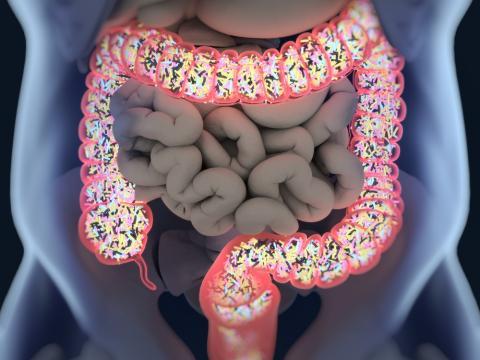Recent studies have demonstrated the beneficial effects of butyrate on the intestinal ecosystem. Thanks to its action on intestinal permeability and its role as an anti-inflammatory, butyrate may offer a particularly valuable strategy for preventing certain digestive pathologies such as chronic inflammatory bowel disease, diverticulitis and irritable bowel syndrome.
Butyrate and irritable bowel syndrome
Irritable bowel syndrome affects 10 to 20% of the general population and is expressed as chronic abdominal pain. Disruption of the intestinal ecosystem and of the brain-gut axis lies at the origin of this disease.
To reduce the intestinal inflammation, sufferers are advised to investigate the effects of their diet on their condition, notably by following a low-FODMAP diet.
A recent study1 showed that, for people with irritable bowel syndrome, a reduction in their consumption of short-chain carbohydrates, or FODMAPs, can alleviate their functional gastrointestinal symptoms.
However, since most FODMAPS’s are prebiotics provided by a diet rich in fibre, diets of this type reduces the production of butyrate.
When approved by a health professional and taken in combination with a standard treatment, a butyrate supplement can overcome a possible butyrate deficiency and help to balance the intestinal microbiota.
Butyrate and CIBD
The conditions known as chronic inflammatory bowel diseases (CIBD) are Crohn’s disease and haemorrhagic ulcerative colitis. These pathologies are characterised by recurrent inflammation along the gastrointestinal tract. Genetic predisposition, inappropriate immune system responses and environmental factors may be involved in CIBD.
With regard to the environmental factors, an increasing number of studies have revealed that dysbiosis is involved as a significant factor in the development and maintenance of CIBD.
In particular, it has been suggested that a reduction in the number of bacteria which produce short-chain fatty acids, and notably butyrate, may be involved in the development and severity of CIBD2.
A recent study also analysed the effects of combining an oral administration of butyrate with the standard treatment for patients with haemorrhagic ulcerative colitis. The results of this pilot study indicate that oral butyrate is well tolerated and could improve the efficacy of the standard treatment3.
Butyrate and diverticulitis
Colonic diverticular disease is characterised by the development of small sack-like pouches called diverticula in the intestinal mucous membrane. The disease is often asymptomatic, but may also be associated with constipation or diarrhoea. This condition primarily affects older people, with signs present in 65% of people aged over 85 years old. In 10 to 25 % of cases, the diverticula become inflamed, which is a condition referred to as diverticulitis.
A balanced diet with a high fibre content is the therapy recommended to patients with this disease. A published clinical study4 has also demonstrated the value of a sodium butyrate supplement for the prevention of diverticulitis. After 12 months of supplementation, a significant reduction in the number of episodes of diverticulitis and an improvement in quality of life were observed in the group given the supplement compared with the control group.
Moreover, the use of probiotics to treat the symptoms of diverticulitis is also an interesting therapeutic option for patients . A supplementation based on three microbiotic strains, Bifidobacterium lactis, Lactobacillus acidophilus and Lactobacillus salivarius LA302, combined with the standard antibiotic significantly reduced the abdominal pain and inflammation caused by diverticulitis.






